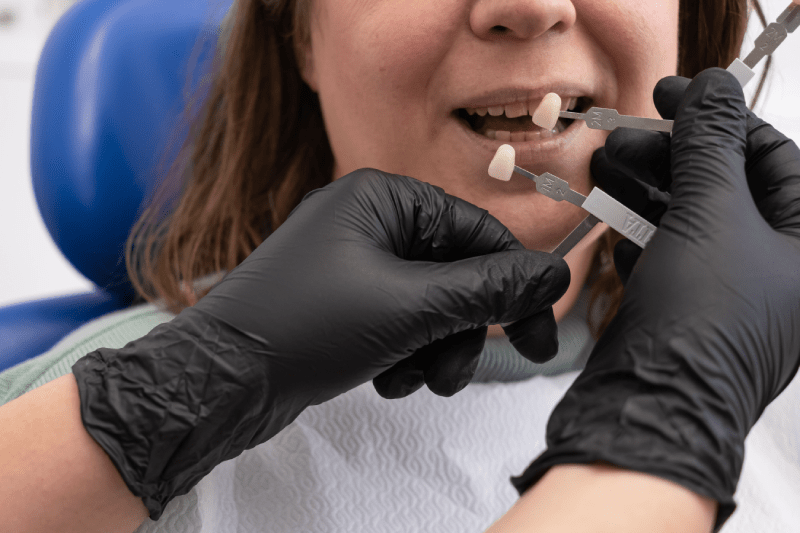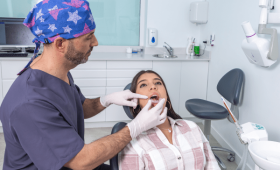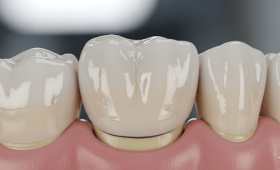What Are The Best Dental Crowns?
The “best” dental crown is the one that is most suitable for an individual’s oral health needs, aesthetic expectations, and budget. To give a general definition, in modern dentistry, zirconia and full porcelain (E-max) crowns are considered the most popular and best options in terms of the balance between aesthetics and durability.
Zirconia offers high durability and a natural appearance without a metal substructure, making it ideal for posterior teeth in particular. Full porcelain crowns, on the other hand, provide aesthetics closest to natural teeth thanks to their light translucency and are preferred for anterior teeth. However, a detailed examination and personal evaluation by your dentist are critically important for making the right choice. Your dentist will recommend the most suitable material for you based on your tooth’s condition and your goals.
Why Are Zirconia Crowns Preferred?
Zirconia crowns stand out as a revolutionary material in the dental field. Thanks to their high biocompatibility, they minimize the risk of allergic reactions. Since these crowns do not contain metal, an aesthetically unpleasant gray line does not form even if gum recession occurs over time. They offer a superior aesthetic appearance with their structure that perfectly matches the natural tooth color and allows light to pass through.
Additionally, the incredibly strong and durable nature of zirconia makes it an ideal solution, especially for posterior teeth where chewing pressure is high. Zirconia crowns have become the top choice for those seeking long-lasting smile aesthetics and functionality. For more information about these crowns, you can consult with the expert team at Cure Holiday.
What Are The Advantages Of Full Porcelain Crowns?
Full porcelain crowns, as the name suggests, are made entirely of porcelain material and do not contain a metal substructure. This is their biggest advantage. The most prominent feature of full porcelain is its light translucency, which is very similar to natural tooth enamel. This allows light to pass through the crown, creating a natural brightness and depth.
When applied to anterior teeth in particular, it offers an aesthetic that is almost impossible to detect. Furthermore, since they do not contain metal, they are a safe option for patients with metal allergies. The smooth surface of porcelain is also very resistant to staining. For those who want to achieve the highest level of aesthetic results, full porcelain crowns are an indispensable option.
Are Porcelain-Fused-to-Metal Crowns Still Used?
Porcelain-fused-to-metal crowns were very commonly used in the past due to their durability and affordability, and they can still be preferred in some cases. The internal structure of these crowns is made of metal, and porcelain is applied on top. The metal substructure gives the crown high strength, which makes it resistant to the high chewing pressure on posterior teeth.
However, they have some aesthetic disadvantages. The color of the metal can be seen as a gray shadow at the gum line, especially if gum recession occurs. For this reason, they are no longer preferred in areas with high aesthetic expectations, such as anterior teeth. Today, more biocompatible and aesthetic materials like zirconia and full porcelain crowns are more frequently used.
What Are E-max Crowns and Who Are They Suitable For?
E-max is an extremely aesthetic and durable crown material produced from a special type of porcelain called lithium disilicate. E-max crowns are one of the most frequently preferred materials for anterior teeth aesthetics because they offer the light translucency and color closest to natural teeth. Thanks to their natural and transparent appearance, they blend perfectly with other teeth.
E-max also has sufficient durability, so it can be used on both anterior and posterior teeth, although it may not be as strong as zirconia in the posterior teeth where chewing forces are very high. For patients with high aesthetic concerns, especially those seeking the most natural and beautiful result for their anterior teeth, E-max crowns are an ideal solution.
How Important Is Aesthetics in Choosing a Dental Crown?
Aesthetics in dental crown selection are of great importance depending on the patient’s expectations and the location of the tooth to be crowned. Especially for teeth located in the smile line, such as anterior teeth, aesthetics is a criterion as important as functional durability. Patients want crowns to be so aesthetic that they are indistinguishable from their natural teeth.
In this case, materials with high light translucency, such as full porcelain or zirconia, which provide natural color and texture, come to the forefront. For posterior teeth, since chewing function is a priority, aesthetics may be secondary, but a natural appearance is still important. You can achieve the best result by sharing your aesthetic expectations with your dentist.
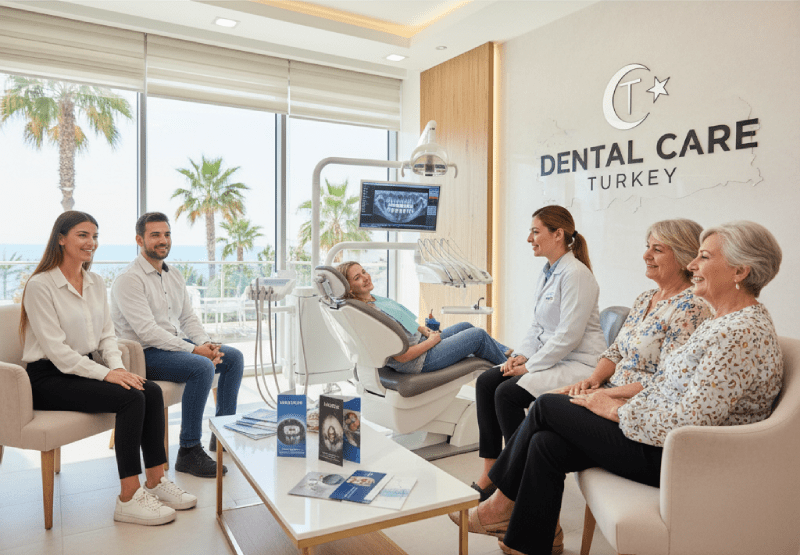
Which Crown Offers The Most Natural Appearance?
The crowns that offer the most natural appearance are undoubtedly full porcelain and zirconia crowns. These materials can mimic the light translucency, which is one of the most important features of natural tooth enamel. Unlike porcelain-fused-to-metal crowns, these crowns allow light to pass through the tooth, creating a natural brilliance and depth.
Especially full porcelain crowns based on lithium disilicate like E-max, thanks to their thin and translucent structure, provide a perfect match with other teeth. Your dentist will analyze the color and structure of your teeth and choose the material and shade that will give you the most natural result. Cure Holiday clinics use advanced technology and quality materials to achieve the most natural results.
How Is Durability a Criterion in Crown Selection?
Durability in crown selection is a critical criterion, especially for posterior teeth where chewing forces are intense. The durability of the crown minimizes risks such as cracking, chipping, or wear, ensuring long-lasting use. From this perspective, zirconia crowns are one of the most durable options. Zirconia is a material that is even harder than natural tooth enamel and is resistant to wear. Therefore, zirconia crowns are the first choice in areas subjected to high chewing pressure, such as posterior molars. Zirconia crowns are ideal for those seeking both durability and aesthetics.
Which Crown Type Should Be Chosen For Anterior Teeth?
The most important criterion for anterior teeth is aesthetics. Therefore, crown types that offer the most natural and translucent appearance are preferred. E-max (full porcelain) crowns are an ideal choice for anterior teeth because they allow light to pass through perfectly, providing a complete blend with natural teeth.
Zirconia crowns can also provide high aesthetic results when produced with modern technologies and offer the advantage of durability. Your dentist will evaluate the color, shape, and position of your teeth and recommend the most suitable crown type for you. You can share your aesthetic expectations in detail during your consultation with Cure Holiday.
Which Crown Type Is More Suitable For Posterior Teeth?
Since the main goal for posterior teeth is to restore chewing function, durability is the most important criterion. Therefore, zirconia crowns are the most suitable option for posterior teeth. Zirconia is an extremely durable material and can easily withstand high chewing pressure. Additionally, the aesthetic quality of zirconia crowns has improved significantly today, making them not only a functional but also an aesthetic solution. Although porcelain-fused-to-metal crowns are also an option in terms of durability, zirconia is preferred more often due to its biocompatibility and aesthetic advantages.
What Is the Difference Between Porcelain and Zirconia Crowns?
The fundamental difference between porcelain and zirconia crowns lies in their structure and durability. Full porcelain crowns (like E-max) have a light translucency closer to natural tooth enamel and therefore offer the highest aesthetic result. However, they are not as durable as zirconia. Zirconia is a much harder and more durable material and is more resistant to chewing pressure than porcelain. For this reason, while porcelain crowns are generally preferred for anterior teeth, zirconia can be used on both anterior and posterior teeth. Your dentist will determine the most suitable material based on the location of your tooth and your functional needs.
Which Crown Material Is More Biocompatible?
Biocompatibility means that the crown material is compatible with the body’s tissues and does not cause allergic reactions. In this regard, zirconia and full porcelain crowns are the most biocompatible materials. Since they do not contain metal, they can be safely used even in individuals with metal allergies. Traditional porcelain-fused-to-metal crowns can contain metals like nickel, which may cause allergic reactions or gum inflammation in some patients. Therefore, it is very important to inform your dentist if you have a known metal allergy before treatment.
How Does Digital Dentistry Affect Crown Quality?
Digital dentistry has significantly increased the quality and speed of crown treatment. Instead of traditional impression taking, digital scanners are used to obtain precise three-dimensional images of the teeth. This digital data is transferred to CAD/CAM (Computer-Aided Design and Manufacturing) technology to design and produce the crown.
This process minimizes human error, ensures the perfect fit of the crown with the tooth, and speeds up the treatment. It offers possibilities like single-visit crown production, increasing patient comfort. Cure Holiday clinics use all the capabilities of digital dentistry to ensure the highest quality.
How Is Oral Health Evaluated When Getting a Dental Crown?
Before getting a dental crown, your dentist will perform a detailed evaluation of your oral health. This evaluation includes the general condition of the tooth to be crowned, any existing decay, old fillings, and the health of the tooth’s nerve. At the same time, the health of the gums is also checked. If there is any infection or inflammation in the teeth or gums, these must be treated first. Because a crown placed without a healthy foundation can lead to long-term problems. This comprehensive evaluation is critically important for the success of the treatment and the lifespan of the crown.
What Factors Influence Crown Selection?
There are many factors that influence dental crown selection. The most important among these are the location of the tooth to be crowned (aesthetics for anterior teeth, durability for posterior teeth), the patient’s budget and aesthetic expectations, habits like teeth grinding, and whether there is a metal allergy. Your dentist will combine these factors to recommend the most suitable crown material for you. For example, different options such as E-max for anterior teeth, zirconia for posterior teeth, or porcelain-fused-to-metal if the budget is limited are considered.
Which Crown Material Does Not Cause Allergic Reactions?
For individuals with metal allergies, the safest crown materials are options that are completely metal-free. This category includes zirconia and full porcelain (E-max) crowns. These materials are highly biocompatible, so the risk of rejection by the body or causing allergic reactions is very low. Traditional porcelain-fused-to-metal crowns can contain metals like nickel that can cause allergies. Therefore, if you have a known metal allergy, it is very important to inform your dentist before treatment.
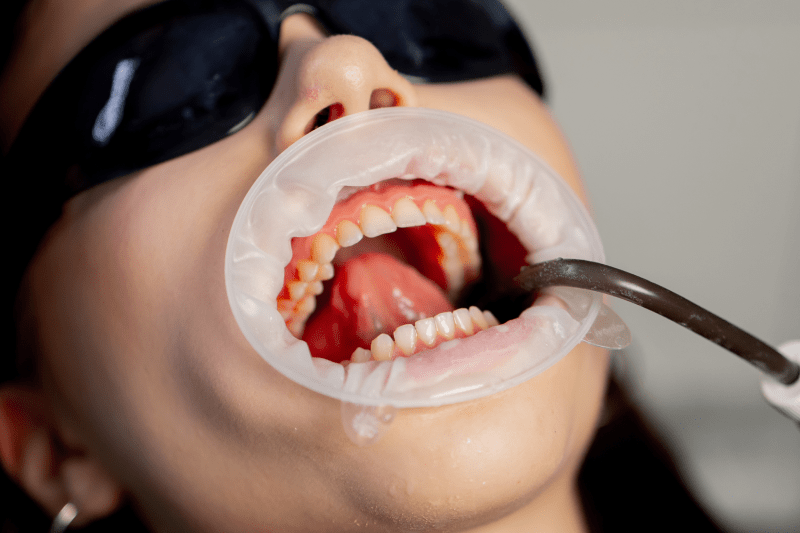
What Is The Best Dental Crown Price?
The “best” dental crown price is not the cheapest one, but rather the one that offers quality, durability, and aesthetics all in one. Generally, zirconia and E-max crowns are more expensive than lower-cost porcelain-fused-to-metal crowns, but the aesthetic and long-lasting use advantages they offer justify this cost. The price also varies depending on the dentist’s experience, the clinic’s location, and the technology used. To get the most accurate price, a personalized treatment plan needs to be created after a detailed examination. Cure Holiday ensures you receive the highest quality treatment at the most suitable prices.
What Is The Role Of The Dentist In Crown Selection?
The role of the dentist in crown selection is vital. Your dentist is not just the person who performs a treatment but also an expert who guides you in making the right decision. They will evaluate your oral structure, the condition of your teeth, and your general health history to determine the most suitable crown material and treatment plan for you. At the same time, they will work collaboratively with you to understand your expectations and provide you with realistic results. An experienced dentist will not only meet your aesthetic expectations but also ensure your crown is long-lasting and functional.
How Long Does Crown Treatment Take?
The duration of crown treatment varies depending on the technology used by the dentist and the number of teeth to be treated. Crown treatment done with traditional methods is usually completed in two appointments. In the first appointment, the tooth is prepared and an impression is taken, a process that takes about an hour. The second appointment, for placing the crown produced in the lab, is a few days later. However, with digital technologies like CAD/CAM, it is possible to produce and place a crown in a single appointment. This significantly shortens the treatment time and increases patient comfort.
Which Crown Type Is The Most Long-Lasting?
The lifespan of dental crowns depends on the material used and oral hygiene. In terms of durability and longevity, zirconia crowns are one of the most long-lasting options. Zirconia is an extremely durable material that is highly resistant to chipping, wear, and cracking. A properly placed and well-cared-for zirconia crown can be used without problems for 15 years or more. To extend the life of the crown, it is very important not to neglect regular dental check-ups and oral hygiene routines.
How Can The Lifespan Of A Dental Crown Be Extended?
Extending the lifespan of a dental crown is possible with proper oral hygiene and regular care. Brushing at least twice a day keeps the crown and the surrounding gums clean. Using dental floss and mouthwash is also very important to clean food particles that can get stuck under the crown and in between teeth. Avoiding very hard or sticky foods prevents the crown from cracking or loosening. If you grind your teeth at night, using a night guard will protect your crowns. Remember, a good oral health routine will extend the life of your crown.
How Does Digital Impression Taking Make Crown Treatment Easier?
Digital impression taking eliminates the discomfort caused by traditional impression methods and makes the treatment much more comfortable. It prevents the gag reflex caused by the putty used in traditional methods. Digital scanners instantly create a three-dimensional model of the teeth, and this model allows for the perfect design of the crown in a computer environment. This technology enables the dentist to create a more accurate and precise crown, which guarantees a perfect fit with the tooth. Cure Holiday clinics use this advanced technology to achieve the best results.
Which Crown Looks Best When I Smile?
The crown that looks best when you smile is the one that is most compatible with your natural teeth. To achieve this harmony, full porcelain (E-max) and zirconia crowns are preferred. Full porcelain crowns reflect light like natural teeth, providing a transparent and vibrant appearance. Zirconia offers a combination of aesthetics and durability, providing a natural unity, especially when multiple crowns are being placed. When planning your smile aesthetics, your dentist will also take into account your facial features, skin tone, and lip structure to choose the most suitable color and shape for you.
What Are The Aesthetic Disadvantages of Porcelain-Fused-to-Metal Crowns?
The biggest aesthetic disadvantage of porcelain-fused-to-metal crowns is the gray or dark shadowing caused by the metal substructure. Especially when gum recession occurs over time, the metal edge of the crown can become visible, causing an aesthetically unappealing line. Additionally, since metal is an opaque material, it does not reflect light, which can make the crown look lifeless and artificial. For this reason, zirconia or full porcelain crowns, which are aesthetically superior, should be preferred for anterior teeth located in the smile line.
In Which Situations Is A Full Porcelain Crown Not Chosen?
While full porcelain crowns are aesthetically wonderful, they may not be the best option in every situation. Especially in posterior molars where chewing pressure is very high, full porcelain crowns may not be durable enough and may carry the risk of cracking or chipping. Also, in individuals with habits like teeth grinding (bruxism), full porcelain crowns may wear down more quickly. In such cases, zirconia crowns, which are a more durable material, may be a more suitable alternative. The choice should be made based on the location of the tooth and the patient’s personal habits.
Which Crown Is Suitable For People With Teeth Grinding Problems?
Teeth grinding (bruxism) is a problem that can significantly shorten the lifespan of crowns. Therefore, the best crown option for individuals with teeth grinding problems is zirconia crowns, which have high durability. The hard and wear-resistant structure of zirconia protects the crown against chewing forces. However, no matter how durable the crown is, it is essential to use a night guard to manage the teeth grinding habit. This guard prevents the crowns and natural teeth from wearing down and protects overall oral health.
What Preparations Are Needed Before Getting A Dental Crown?
Before getting a dental crown, your dentist will make the necessary preparations for the success of the treatment. These preparations include cleaning any decay in the tooth to be crowned, replacing old fillings, or performing a root canal treatment if the tooth’s nerves are damaged. Additionally, if there is inflammation or disease in the gums, these problems must be addressed first. A crown placed on a healthy foundation will be both more long-lasting and prevent potential complications. These preparations are an important part of your treatment plan.
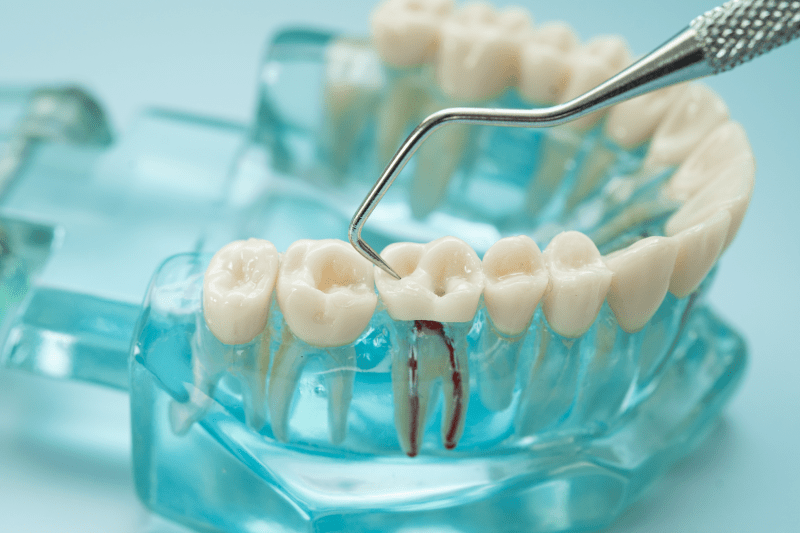
What Technologies Are Used For The Best Crowns?
For the best crowns, modern dentistry uses advanced technologies. Digital scanners take precise three-dimensional measurements of the teeth. This data is used by CAD/CAM (Computer-Aided Design and Manufacturing) systems to digitally design and produce the crown. This technology guarantees the perfect fit of the crown with the tooth and speeds up the production process. Digital color matching devices are used for color selection, which allows the crown to achieve a perfect color match with the other teeth. These technologies enhance both the quality of the treatment and maximize patient comfort.
Which Crown Material Is More Resistant To Staining?
Dental crowns are more resistant to staining than natural teeth. However, the tendency to stain may differ depending on the material. Porcelain and zirconia crowns are highly resistant to staining due to their smooth and non-porous surfaces. Stains caused by colored drinks and foods like coffee, tea, and red wine form more easily on natural teeth, while these materials do not show stubborn stains. Regularly brushing the surface of the crowns and flossing is enough to maintain their shine.
Why Should Turkey Be Preferred For Dental Crown Treatment?
Turkey has become a worldwide health tourism hub for dental crown treatment. The main reasons for this are more affordable treatments compared to Western countries, high-quality service, experienced dentists, and modern technological infrastructure. Clinics in Turkey offer top-level treatments using the best materials and make these treatments attractive to patients by combining them with vacation opportunities. Companies like Cure Holiday plan the entire process for you, ensuring you have a comfortable and safe treatment experience without any questions in your mind.
How Effective Are Personal Preferences In Crown Selection?
Personal preferences are quite effective in determining aesthetic and functional goals in crown selection. Your dentist will take into account what you want, what kind of smile you want to have, and your budget, and will offer you different options. For example, for a patient who wants the most natural and translucent look, full porcelain is recommended, while for a patient who prioritizes durability, a zirconia crown is suggested. Clearly expressing your personal preferences ensures that you achieve exactly the smile you want as a result of the treatment.
What Determines The Cost Of A Dental Crown?
The cost of a dental crown is determined by several main factors. The most important factor is the material the crown is made from; aesthetic materials like zirconia and E-max are more expensive than porcelain-fused-to-metal crowns. The number of teeth to be treated also directly affects the total cost. Furthermore, the dentist’s experience, the technological facilities offered by the clinic, and the geographical location where the treatment will take place also play a decisive role in the price. Pricing is usually personalized based on the treatment plan.
Is Dental Crown Treatment Covered By Health Insurance?
Whether getting a dental crown is covered by health insurance depends on the insurance policy you have. Crowns for aesthetic purposes are generally not covered by insurance. However, treatments performed to restore or protect the function of the tooth may be partially or fully covered by insurance. It is important for foreign patients considering treatment in Turkey to consult with their insurance companies in advance to get information about the coverage.
What Are The Aftercare Tips For Dental Crowns?
Aftercare for dental crowns is vital for their longevity. Regularly brushing and flossing keep the tooth under the crown and the surrounding gum healthy. Additionally, special toothbrushes or mouthwashes can be used to prevent plaque buildup at the edges of the crown. Avoiding very hard and sticky foods prevents the crown from breaking. Going for regular dental check-ups also helps detect potential problems early.
Why Should I Consult Cure Holiday For Crown Selection?
Choosing a dental crown can be a complex process and requires professional guidance to make the right decision. Cure Holiday collaborates with clinics specialized in dental crown treatment and equipped with the latest technology to offer you the best service. Experienced dentists will evaluate your individual needs and expectations to determine the most suitable crown type and treatment plan for you. Thanks to their transparent pricing policy and full-service treatment organization, you can complete your treatment comfortably and safely without any questions in your mind. Contact Cure Holiday to take another step closer to the smile of your dreams.
